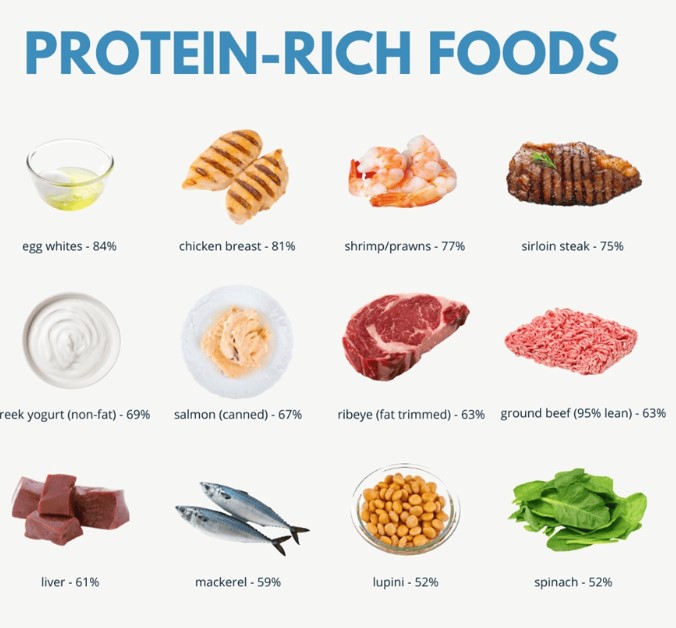BOURSESSENEGAL – When it comes to nutrition, few things are as essential as protein. Foods high in protein play a vital role in our overall health. They support muscle growth, boost metabolism, and help keep you feeling full longer. Whether you’re an athlete, a fitness enthusiast, or someone looking to maintain a balanced diet, understanding protein-rich foods is crucial. In this article, we’ll dive deep into the best sources of protein, their benefits, and how to incorporate them into your meals.
What is Protein?
Understanding Protein’s Role in the Body
Protein is one of the three macronutrients, alongside carbohydrates and fats. It’s made up of amino acids, which are the building blocks of our cells, tissues, and organs. Protein serves numerous functions in the body:
- Muscle Repair and Growth: Essential for athletes and those engaged in strength training.
- Enzyme Production: Enzymes facilitate chemical reactions necessary for life.
- Hormone Regulation: Proteins act as hormones that regulate various bodily functions.
- Immune Function: Antibodies, which are proteins, help the body fight infections.
Why You Need Foods High in Protein
Benefits of a Protein-Rich Diet
- Weight Management: High-protein foods can help you feel fuller for longer, reducing overall calorie intake.
- Muscle Maintenance: Consuming sufficient protein helps preserve lean muscle mass, especially during weight loss.
- Increased Metabolism: Protein has a higher thermic effect than fats and carbohydrates, meaning your body burns more calories digesting it.
- Better Nutrient Absorption: Protein aids in the absorption of essential nutrients, supporting overall health.
Top Foods High in Protein
Animal Sources of Protein
- Lean Meats
- Chicken breast: A staple for those looking to increase protein intake.
- Turkey: Leaner than red meat, turkey offers a rich protein source.
- Fish and Seafood
- Salmon: Packed with omega-3 fatty acids and high in protein.
- Tuna: A convenient, protein-rich option that’s also low in calories.
- Eggs
- Whole eggs: Often regarded as one of the most complete sources of protein, eggs contain all essential amino acids.
- Dairy Products
- Greek yogurt: This thick yogurt packs more protein than regular yogurt and is great for snacks or breakfast.
- Cottage cheese: Low in fat but high in protein, it’s perfect for a healthy snack.
Plant-Based Sources of Protein
- Legumes
- Lentils: High in protein and fiber, lentils are a versatile ingredient for soups and salads.
- Chickpeas: A great addition to salads or as a base for hummus.
- Nuts and Seeds
- Almonds: Rich in protein and healthy fats, almonds are perfect for snacking.
- Chia seeds: These tiny seeds pack a protein punch and are rich in omega-3 fatty acids.
- Whole Grains
- Quinoa: A complete protein source that provides all nine essential amino acids.
- Brown rice: While lower in protein than quinoa, it can be combined with beans for a complete meal.
- Vegetables
- Spinach: While not high in protein compared to animal sources, spinach adds a boost of protein to salads and smoothies.
- Broccoli: This green vegetable contains a surprising amount of protein for a veggie.
How to Incorporate High-Protein Foods into Your Diet
Meal Planning Tips
- Breakfast Ideas
- Start your day with a protein-packed smoothie using Greek yogurt and spinach.
- Try scrambled eggs with spinach and tomatoes for a hearty breakfast.
- Lunch and Dinner Suggestions
- Make a quinoa salad with chickpeas, cucumbers, and a lemon dressing.
- Grill chicken breast and serve it with steamed broccoli and brown rice.
- Snack Options
- Snack on a handful of almonds or Greek yogurt with fruit.
- Enjoy hummus with carrot sticks or whole-grain crackers.
Portion Control and Balance
While high-protein foods offer numerous benefits, balance is key. Aim for a variety of protein sources throughout the day to ensure you get all essential amino acids. Remember to pair proteins with healthy fats and carbohydrates for a well-rounded meal.
Protein Supplements: Do You Need Them?
When to Consider Protein Supplements
While whole foods should be your primary source of protein, protein powders and bars can be convenient options for those with increased protein needs, such as athletes or individuals with busy schedules. However, consult a healthcare professional before adding supplements to your diet.
Final Thoughts
Incorporating foods high in protein into your diet is a smart choice for maintaining health, building muscle, and managing weight. With a plethora of options available, from lean meats and fish to legumes and nuts, there’s something for everyone. As you explore the world of protein-rich foods, you’ll discover not only delicious meals but also a path to a healthier lifestyle. Start today, and unlock the power of protein!
Call to Action
Ready to enhance your meals with protein? Experiment with different sources, and share your favorite recipes with us! Your journey to a healthier diet starts now.
REFERENCE : shoot588



